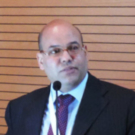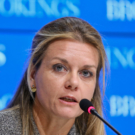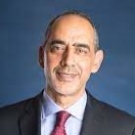Speakers

Fathi Ali
Assistant Professor of Economics
University of Benghazi

Hala Bugaighis
Director and Co-Founder
Jusoor Center for Studies and Development

Federica Saini Fasanotti
Senior Associate Fellow
Italian Institute for International Political Studies (ISPI)

Tarik M. Yousef
Senior Fellow and Director
Middle East Council On Global Affairs
About the Webinar
On August 30, Arab Center Washington DC (ACW) hosted a webinar tilted “The Future of Libya: Prospects for Economic Development and an End to the Conflict.” Panelists were Fathi Ali, Assistant Professor of Economics at the University of Benghazi and Former Vice President of the Presidential Council of the Libyan Government of National Accord; Hala Bugaighis, Director and Co-Founder of the Jusoor Center for Studies and Development; Federica Saini Fasanotti, Senior Associate Fellow at the Italian Institute for International Political Studies and Nonresident Senior Fellow at the Brookings Institution; and Tarik M. Yousef, Senior Fellow and Director at the Middle East Council On Global Affairs. Imad K. Harb, Director of Research and Analysis at ACW, moderated the event.
Fathi Ali opened the webinar by stating that the future of Libya requires an explanation that starts from the very beginning of the conflict. He said that while there are numerous causes behind Libya’s 2011 uprising, he believes in the importance of focusing on its economic aspects. Prior to 2011, he argued, the Qadhafi regime cemented both tribal and regional identities through selective recruitment into the security sector, causing a split between west and east. This split, Ali said, is important to understanding the continued importance of tribal and regional identities, which play out today in the form of rival governments based in Tripoli in the west and Tobruk in the east. He also argued that security dynamics go hand in hand with economic ones, since even in the beginning of the conflict military leaders started to learn that they could make both political and economic gains using violence. According to Ali, there was a shift in 2013 from political to economic violence, and security elites today still operate under the assumption that violence can lead to economic gains. “What is happening in Libya,” Ali stated, “is not some sort of insanity or people destroying their country. No, they are responding to new metrics of incentives—economic incentives. And these incentives…are blocking the way of solving the Libyan conflict.” In order to reduce said conflict, Ali recommended that it is necessary to “increase the cost of using violence.”
When asked to further explain how to resolve the conflict using an economic approach, Ali argued that it is important to focus on the marginalization of the country’s eastern region. He stated that “greedy politicians” in Libya get their power from mobilizing people, harnessing their grievances, and promising them benefits for their participation. Ali warned against rushing to hold elections, arguing that they are likely to lead to more conflict in the present environment. Rather, he counseled that any peace agreement should involve a system of power sharing with substantial decentralization that delegates power to local participants in order to overcome regional rivalries. Finally, Ali warned that the involvement of regional and international powers will merely continue to fuel the violence.
Hala Bugaighis further addressed the state of the Libyan economy, and particularly the private sector, in the midst of the ongoing crisis. While corruption and economic uncertainty have weakened the business environment, Bugaighis argued, the private sector has played a vital role in keeping the economy going. Where politicians have neglected public services, including health, education, and infrastructure, the private sector has stepped in to fill the gap. But regardless of this positive development, Bugaighis outlined four main challenges that the Libyan economy currently faces. First, she noted a “lack of vision” for the future of the economy, including an inability to decide even something as basic as whether and how the country should adopt elements of a planned or market economy. Bugaighis then spoke of Libya’s vulnerability to “elite capture,” wherein the resources of the public sector are controlled by a small group, thereby limiting opportunities for development. Next, she discussed Libya’s liquidity crisis, which has existed since well before the conflict, and which limits access to loans and lines of credit that could provide opportunities for businesses to flourish.
Finally, Bugaighis addressed the informal economic sector, the sheer size of which limits the Libyan economy. However, she described its prominence as “a normal result because there is a lack of trust between the state and businesses.” Meanwhile, Bugaighis said, the informal economy has provided opportunities for Libyan women in particular, helping them to overcome social norms that continue to keep them out of the formal economy. Women’s activity in the informal economy, Bugaighis explained, has helped contribute to the reduction of poverty. However, since women are largely unrepresented in the economic decision-making process, they still represent an “untapped resource.” In concluding her discussion, Bugaighis lamented missed opportunities during the 2021 Berlin Conference to develop a “unified economic vision” for Libya. Experts’ recommendations, she said, were largely ignored, save for the consolidation of the Central Bank of Libya and the creation of a unified budget, neither of which will be enough to right the course of the Libyan economy.
Tarik M. Yousef dedicated his time to providing a broader picture of the economic and political crises in Libya. Picking up where Ali left off, namely on the fact that economic violence has supplanted political violence, Yousef argued that any solution must begin by changing the incentives that are driving said violence. And rather than focusing on a very local scale—on the militias and other culprits enacting this violence—efforts must begin at the very top, “among warring political and non-political factions that have had every opportunity at altering behavior, at choosing a different path.” What we have seen, Yousef said, is an endless cycle of political crisis leading to violence, which then leads to UN-sponsored dialogues. Dialogues in turn lead to “a political process that delivers a government that leads to rampant corruption and further degradation of the infrastructure and a weakening of the country’s institutions, only for war and violence to emerge again and for the UN process to respond.” Thus, for Yousef, the time has come to “go back to the drawing board” and to develop solutions that avoid the mistakes of the past.
Yousef argued that fixing Libya’s economy is of utmost importance, given that it is currently in a “tailspin” and that the country’s “corrupt and compromised political elite” have shown themselves incapable of providing a solution. Yousef agreed with Bugaighis that there has been an utter lack of vision for the country’s economy, and added that there has also been a lack of the very conversations that might bring about such a vision. Moreover, he said, there has been a dearth of attention to what Libya’s economy needs as a whole, in favor of “microprocesses on the ground.” Without a broader focus and vision, Yousef insisted, “Libya will continue to drift.” What is also needed, however, is engagement from the international community and with global financial institutions. Yousef decried the international community’s growing disengagement with and disinterest in the Libyan conflict, and argued that international governments and institutions need to step in to defuse the crisis, organize elections, and begin building institutions, in addition to making investments that will help rebuild the country’s direly neglected public services. In the end, Yousef said, “Libya is too geopolitically significant…for this crisis to escape getting the attention it deserves in the coming period.”
Federica Saini Fasanotti focused her comments on the importance of democracy for Libya, and on the means by which it can be achieved. Fasanotti said that despite 11 years of meetings and conferences in Paris, Palermo, Abu Dhabi, and Berlin, and despite the efforts of the United Nations Support Mission in Libya (UNSMIL), the fact remains that “the country is in turmoil.” Although the idea behind these many talks was to create a desire for democracy in the country, in Fasanotti’s opinion, today “there is nothing democratic here”; nor is there any interest in UN-sponsored mediation. Making matters worse, international consensus is lacking, partly due to geopolitical competition between nations such as France and Italy, each of which has a “completely different way of tactical thinking” when it comes to the crisis in Libya.
Speaking of prospects for democracy in the country, Fasanotti argued that UNSMIL’s biggest mistake “was to treat the Libyan counterparts as democratic politicians,” which they are not. Rather, they are “parties fighting for power and not for the good of the nation.” If the task of finding a solution to the crisis is left to these parties, Fasanotti said, “there will be no solution at all.” For her, it is crucial that there be a focus on institutions and not on individuals, because institutions are “the foundation for democracy” representing the “link between politics and the population.” Weak institutions, such as are currently found in Libya, are not able to contain violence, and this in turn leads to instability. Fasanotti stated that things cannot be left to the political class, since it is unable to achieve democracy, and argued that, “If you want peace, you have to intervene militarily,” with a “more present” international intervention that permits the control of terrain and of the political class. What is needed in Libya, she said, is a single government with a monopoly on force, one that can rid the country of its many warring militias. “You cannot have governance,” Fasanotti said, “until you have control of this oligopoly of violence.”
Image credit: fayeandsteve.com
